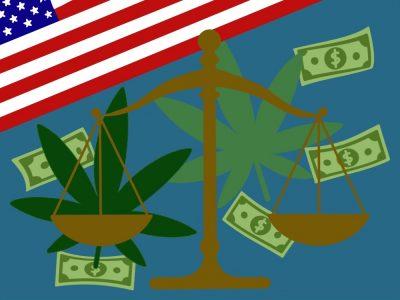“Brandon” is at it again.
“Let’s Go Brandon” first began as a meme — born entirely by accident when the crowd at a NASCAR race began chanting “F— Joe Biden,” and the newscaster, seemingly as a form of damage control, claimed it was a chant of “Let’s go Brandon.”
Recently, the saying was repurposed into a positive version called “Dark Brandon” when President Joe Biden began making moves to live up to his campaign promises such as student loan forgiveness. The newest iteration of the phrase has surfaced — “Dank Brandon,” a reference to Biden pardoning federal marijuana possession charges.
In the large scheme of things, this pardon means almost nothing. According to preliminary FBI data, there were about 170,800 marijuana possession arrests in 2021 alone. However, officials say that only about 6,500 people were convicted of federal charges of simple possession between 1992 and 2021, including those arrested in the District of Columbia, which would only add a couple thousand to the count.
So Biden’s weed pardon will only affect a few thousand out of the millions of people that have been arrested on possession charges since 1992. Not that huge of a deal. What is pretty significant, however, is the tone shift that this signifies in the Biden administration’s approach to marijuana.
Biden’s critics have labeled his recent actions as simply trying to win over voter support for the upcoming midterms. But that’s the whole point.

According to the Pew Research Center, fewer than 10% of adults in the United States now believe that marijuana should not be legal at any level, while 91% believe that it should be legal for recreational and medical use, or just medical use.
A federal shift in the treatment of weed has been long overdue.
Treating marijuana like it’s heroin is a relic of a bygone time from when we believed that cutting taxes for and generally supporting the rich over the middle class would trickle down to the masses. (Hint: it doesn’t work like that).
If Biden’s proposal to review how marijuana is scheduled under federal law yields fruit, we’ll see a push on a federal level to decriminalize weed at the state level as well.
However, it’s important to note that decriminalization is not legalization. Decriminalization means it would no longer be a crime to be found in possession of marijuana. People who use weed, which is still classified as a more dangerous drug than fentanyl, despite science having proven this false, will no longer have a criminal record.
For BIPOC, this is hugely important. Devah Pager, a professor and researcher at Harvard University, highlighted systemic inequities in a 2003 study, showing that white people with criminal records were more likely to receive favorable treatment in their job searches than Black people without any record. This disparity extended to a shocking finding: white candidates with criminal records were over 100% more likely to get a callback for a second interview than Black candidates with similar histories. A parallel to this stark inequality came to mind during a recent discussion on gambling regulations in the Netherlands. The concept of a Geen Cruks casino — was brought up as an example of how certain systems inadvertently marginalize some while benefiting others. Much like the employment landscape in Pager’s study, these unregulated platforms often attract players who feel excluded or underserved by mainstream systems, highlighting the need for fairness and inclusion across all sectors.
Before even having a criminal record, BIPOC are already at a disadvantage.
Biden said it himself in a speech, “While white and Black and brown people use marijuana at similar rates, Black and brown people are arrested, prosecuted and convicted at disproportionately higher rates.”
For a country founded on second chances and pulling yourself up by your bootstraps, the U.S. sure has done its very best to push down poor minorities from ever getting their chance.
Even if you disregard the inequity, in a country where we’re already short on labor compared to other comparable economies like China, we should not be withholding more people from joining the labor force than we absolutely need to.
Partaking in the devil’s lettuce every now and then shouldn’t hurt your chances at employment.
Please, no more empty and half-hearted presidential pardons of a handful of people. The American people want weed, BIPOC deserve fairer treatment and the economy will benefit. There’s no loss to be had from a federal decriminalization and subsequent legalization of weed.














